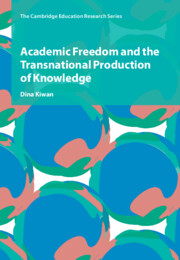Book contents
- Academic Freedom and the Transnational Production of Knowledge
- Reviews
- Academic Freedom and the Transnational Production of Knowledge
- Copyright page
- Dedication
- Contents
- Foreword
- Preface
- Acknowledgements
- 1 Introduction
- 2 Constructions of Academic Freedom
- 3 Constructions of Knowledge
- 4 Producing Knowledge
- 5 Challenging Knowledge
- 6 ‘Forbidden’ Knowledge
- 7 ‘Legitimate’ Knowledge
- 8 Conclusion
- References
- Index
7 - ‘Legitimate’ Knowledge
Methodological Debates and the Political Sociology of Knowledge Production
Published online by Cambridge University Press: 04 January 2024
- Academic Freedom and the Transnational Production of Knowledge
- Reviews
- Academic Freedom and the Transnational Production of Knowledge
- Copyright page
- Dedication
- Contents
- Foreword
- Preface
- Acknowledgements
- 1 Introduction
- 2 Constructions of Academic Freedom
- 3 Constructions of Knowledge
- 4 Producing Knowledge
- 5 Challenging Knowledge
- 6 ‘Forbidden’ Knowledge
- 7 ‘Legitimate’ Knowledge
- 8 Conclusion
- References
- Index
Summary
This chapter turns to the conception of ‘legitimate’ knowledge, first examining constructions of ‘legitimacy’, drawing on political, sociological, and philosophical conceptions. The construction of legitimate knowledge in relation to the conceptions of belief, truth, and justification are considered. In addition, debates pertaining to the recent discourses of the democratisation of knowledge, linked to the notion of ‘expertise’ and ‘stakeholders’, indigenous knowledge and decolonising knowledge are discussed; this entails a critical exploration of various types of factors complicit in the formulation of knowledge, including positionality, with respect to class, political interest, gender, race, and so on; university diversity initiatives; disciplinary quality; methodology and the ‘Canon’; skills, employment, and research assessment initiatives; funding and international partnerships; and global legitimating systems such as global university rankings, publication systems, and citation practices. Furthermore, it is argued that the production of research does not sit outside these positionalities and the politics of knowledge production.
- Type
- Chapter
- Information
- Academic Freedom and the Transnational Production of Knowledge , pp. 135 - 158Publisher: Cambridge University PressPrint publication year: 2024

